
Related
Guests
- Heidi HautalaFinnish politician and member of the European Parliament from Finland. She is a member of the Green League, part of the European Green Party. She spoke out against Trump and Putin at a protest rally in Helsinki on Sunday.
Mass protests greeted President Trump and Russian President Vladimir Putin as they met for a summit Monday in Helsinki. As the two leaders drove from the airport to their summit, they were met by 300 billboards in English and Russian that were posted by the country’s leading newspaper, Helsingin Sanomat, and drew attention to their strained relations with the media. Greenpeace activists unfolded two large banners from the bell tower of Kallio Church in Helsinki that called on the presidents to “Warm Our Hearts, Not Our Planet.” Meanwhile in Helsinki on Sunday, thousands took to the streets to demand human rights, equality and a focus on the climate. We speak with Heidi Hautala, a Finnish politician and member of the European Parliament from Finland, who addressed the protests on Sunday. She is also a member of the Green League, part of the European Green Party.
Transcript
AMY GOODMAN: We begin today’s show in Helsinki, where President Trump is holding a summit with Russian President Vladimir Putin, beginning with a one-on-one, 90-minute meeting. Only their translators are attending the meeting with Trump and Putin. Putin kept Trump waiting for the summit by landing in Finland about an hour late. Trump faces pressure to confront Putin over Kremlin meddling in the 2016 election, after a grand jury Friday indicted 12 Russian intelligence officers for their alleged role in hacking email accounts controlled by the Democratic National Committee and Hillary Clinton’s presidential campaign. We’ll talk more about the U.S. relations with Russia later in the broadcast, when we host a debate between Glenn Greenwald as well as our guest who is head of the Ploughshares Fund, Joe Cirincione. But first we look at the protests that have greeted both Putin and Trump in Finland.
As the two leaders drove from the airport to their summit separately, they were met by 300 billboards, in English and Russian, that were posted by the country’s leading newspaper, Helsingin Sanomat, and drew attention to their strained relations with the media. A poster at the airport read “Mr. President, welcome to the land of free press,” and others used headlines from the newspaper, like “Trump calls media the enemy of the people,” “Putin shuts down Russia’s largest news agency.” This morning, Greenpeace activists unfolded two large banners from the bell tower of Kallio in Helsinki that called on the presidents to, quote, “Warm Our Hearts, Not Our Planet.” On Sunday, the Russian protest group Pussy Riot ran onto the field of play in the World Cup final game, hosted by Russia. They later released demands that included “Free political prisoners,” “Do not put people in jail for social media 'likes,'” and “Allow political competition in Russia.” Meanwhile, in Helsinki Sunday, thousands took to the streets to demand human rights, equality and a focus on the climate. Today, protests continue as the meeting between Trump and Putin gets underway at the Presidential Palace in Helsinki.
For more, we go to Helsinki, where we’re joined by Heidi Hautala, the Finnish politician, member of the European Parliament from Finland. She spoke at the major protest on Sunday. She’s also a member of the Green League, part of the European Green Party.
Welcome to Democracy Now! You are right next to the palace where Trump and Putin are meeting. Can you talk about what your message for Trump and Putin are, as this meeting—as this summit gets underway?
HEIDI HAUTALA: Yeah, thank you very much, and good morning to New York. Actually, I would be in New York City at the moment, but I’m not, because normally I have to stay in my home city when Trump and Putin are here, but otherwise I would have been to the U.N. High-level Policy Forum on Sustainable Development.
So, what is at stake here? We organized the event, Helsinki Calling, yesterday in order to say that now is time to defend democracy and human rights, and that the two leaders, both in their own perverse ways, are a threat to democracy and human rights. So, this is what is at stake here.
AMY GOODMAN: So, you are criticizing both Putin and Trump. Can you talk about, more specifically, what is at stake? As the statement was made by both Trump and Putin, as they go into this private meeting, just the two of them with their translators before bringing in some of their aides, President Trump said that he—that Russia and the United States have 90 percent of nuclear weapons; that’s a bad thing, not a good thing; but communicating with Putin is also not a bad thing, it’s a good thing. Rather, just to get this straight, he said having 90 percent of the nuclear weapons between Russia and the U.S. is a bad thing, not a good thing. And then he said the opposite for their meeting.
HEIDI HAUTALA: Obviously, the hopes here are that the two presidents would start again talking about nuclear disarmament, because the world is probably in a more dangerous situation concerning nuclear weapons as ever before.
But now, to answer your question about what is at stake, more specifically, with both presidents, let’s start with Vladimir Putin, who is, of course, the leader, since 18 years, of our neighboring Russia. He has basically eroded the last hopes of democracy and respect of rule of law and human rights in the country. We know very well that in Russia today there are 158 political prisoners. We have been calling for the release of them yesterday in our event on human rights. And we obviously are very worried that in Russia there is no space for opposition, no freedom of speech. And that’s why the campaign, that you mentioned, by the leading Helsinki Sanomat is wonderful. It really deserves applause, because they are reminded of the wrongdoings of Mr. Putin against freedom of press and freedom of speech, but also of Mr. Trump, who almost every time when he meets the press, he likes to call some of them “dishonest,” like in the Britain during his visit, or he calls them “enemy of the people.” So, we need to be very careful, because these kind of statements are a real danger for freedom of expression. So, this is one very important aspect, that both are a danger for free speech.
AMY GOODMAN: In an interview with CBS at his Turnberry golf course in Scotland on Sunday, Trump was asked who he considers to be a foe. To the surprise of many, his number-one foe was the European Union. This is what he said.
PRESIDENT DONALD TRUMP: Well, I think we have a lot of foes. I think the European Union is a foe, what they do to us in trade. Now, you wouldn’t think of the European Union, but they’re a foe. Russia is a foe in certain respects. China is a foe. Economically, certainly, they’re a foe.
AMY GOODMAN: Heidi Hautala, you are the vice president of the European Parliament. Can you respond?
HEIDI HAUTALA: Yes, absolutely. I think it’s really from a very outdated worldview that you call allies foes and enemies. He, of course, softened a little bit his statement by saying that this is about trade, and he continues to repeat that the EU is, in his view, very bad for the United States and its economy, although I also think that this is very much exaggerated and it’s not true. But, of course, it’s very worrying that the European Union has been the closest ally of the United States for decades, and the United States has been unequivocally supporting European integration, and now we have a president who actually likes the European Union to be disintegrated, which we saw lastly during his visit in the U.K., where he criticized and advised Prime Minister May to be more tough, even to sue the EU, because of this conflict concerning Brexit.
And then, if we look at Mr. Putin, it’s exactly the same. He also likes to see a weak European Union. And it’s very well known that Russia is supporting right-wing—extreme right-wing parties in European member states in order to put in question European integration through these parties. And at the same time, he has a law on foreign agents which makes almost every organization and media outlet criminal if they are receiving foreign financing. So, what is this? This is a real sort of collapse of any morale. This is a super example of double standards from his side.
AMY GOODMAN: Helsinki has hosted numerous Cold War-era negotiations between the United States and, well, what was then the Soviet Union. Can you talk about that history and the meaning of today’s summit? I mean, even that word was questioned, until Trump repeated it over and over, that it is a summit, even if he did not have an exact agenda for it. The distinction between protesting these leaders and whether or not the summit itself is being protested?
HEIDI HAUTALA: Helsinki does have a history of summits between the Soviet Union and Russia, and, even after the collapse of the Soviet Union, between Russia and the United States. But, of course, this is not the same Finland. Finland used to be a country that had to declare itself neutral in order to survive next to a big neighbor, Russia—or the Soviet Union, rather. And this is long overdue to believe that Finland is the same neutral country. I can imagine that Mr. Putin agreed to have this summit in Helsinki because he definitely wants to come to a non-NATO member country. It is true Finland is not a non-NATO member country, but Finland has, since the collapse of the Soviet Union, very, very vehemently objected to any kind of a forced neutrality. And as an EU member state, as, I would say, a proud EU member state, it is, of course, politically aligned with the EU and has an extremely close cooperation with NATO.
AMY GOODMAN: Even though a lot of the corporate networks are based there today, massive number of journalists are in Helsinki, in the United States there’s very little coverage of the thousands of people in the streets and, in the main bell tower, this banner that says, “Warm Our Hearts, Not [Our] Planet.” Talk about the message of the protesters, also—you’re a member of the Green Party—what specifically you’re calling for now, a few years after—well, a year after President Trump has pulled out of the Paris climate agreement.
HEIDI HAUTALA: Yes, indeed. You mention a very, very important sore point. And this whole show, which I hope is not only going to be a show, but it’s a sign that the two leaders, they couldn’t care less about the future of this planet. Basically, they care about themselves, their power, their future. And this is very, very irresponsible, because in every corner of the planet, we start to see that climate change is an existential threat to the people and the planet. And if these two leaders will not talk about it, then we will speak about these things in the streets and in the squares. And that’s what we’re doing. And secondly, we need to talk about human rights, because both are eroding human rights. Both are a danger to rule of law and democracy. So, even if we don’t have hopes that the two presidents will take up these issues and start to defend democracy, we need to radiate this message through the international attention we can now have by the side of this summit, and maybe slowly these things become more important, that also the leaders have to take them seriously.
AMY GOODMAN: Trump is coming out of meeting with NATO, which he fiercely attacked, not so much the organization NATO, but that countries weren’t spending enough money on their militaries, and specifically naming U.S. weapons manufacturers, like a weapons sales show, saying they should be spending far more. As a Green Party member and a politician, your response?
HEIDI HAUTALA: Basically, this is also something that Trump is trying to impose on the EU countries and other NATO member states. And it shows that a large motivation for him in NATO cooperation is the success of the American weapons industries. And this is very dangerous for world peace. Now, let’s hope that the European Union will take a lesson of all this, of all this uncertainty, unpredictability that President Trump is bringing to NATO cooperation, and will start to rely more on its own defense policy. And this is also something that Finland very much hopes for. And in a couple of last years, there’s been quite a big step towards a common European defense, also in terms of innovation and research, so—and defense material. So, probably the best lesson from Trump’s unpredictability is that the EU would finally get its act together more on the defense side, as well.
AMY GOODMAN: What do you want to come out of this summit today?
HEIDI HAUTALA: Well, to be realistic, I don’t expect that climate change, the global poverty will hit the nerves of these two leaders. But there’s maybe some slight hope that they will agree to come back to negotiation tables in order to come back to disarmament negotiations, because, indeed, some very important international agreements between the two countries will run out in 2021, the so-called New START agreement. So we need to be secured of continuation of and coming back to the negotiation tables on disarmament. So, my faint hope is that this might be the best outcome of the summit, which we will hear about very soon.
AMY GOODMAN: Do you think it’s a good thing or a bad thing that they’re meeting?
HEIDI HAUTALA: I think it’s a good thing. I think the people that I am working with all think that dialogue is important. But dialogue on what is, of course, very important. But there’s now the world’s attention on the two leaders, while I think people all over, our countries—the United States, the European Union, maybe even in Russia to some extent—people are more aware of the global threats that really would need to be discussed by such leaders. So, it’s a good thing that they talk, at least that they start talking, because this has been going on for eight years without any real dialogue between the two countries.
AMY GOODMAN: Heidi Hautala—
HEIDI HAUTALA: And we, as an EU country, Finland—
AMY GOODMAN: Go ahead.
HEIDI HAUTALA: Hello?
AMY GOODMAN: Yes, go ahead.
HEIDI HAUTALA: No, I just wanted to say that I think it’s a good thing that Finland can host this important opportunity to start a dialogue between the two.
AMY GOODMAN: Well, I want to thank you so much for joining us, Heidi Hautala, Finnish politician, vice president of the European Parliament, from Finland, member of the Green League, part of the European Green Party, one of the major speakers at one of the protest rallies, the main one, held on Sunday in Helsinki, standing in front of the Presidential Palace, where Presidents Trump and Putin are holding their summit.
This is Democracy Now! When we come back, we’ll be joined, for a debate, by Pulitzer Prize-winning journalist Glenn Greenwald and peace leader Joe Cirincione, head of the Ploughshares Fund. Stay with us.

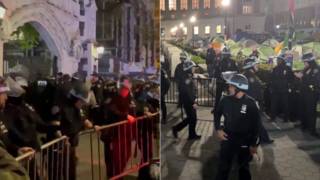
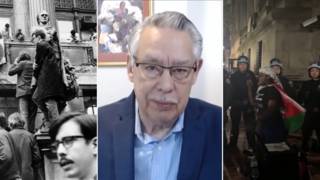
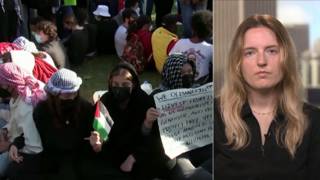
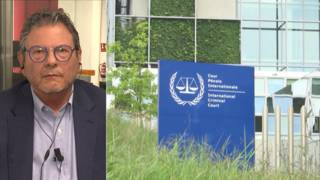





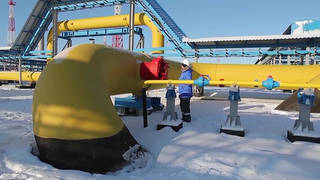
Media Options